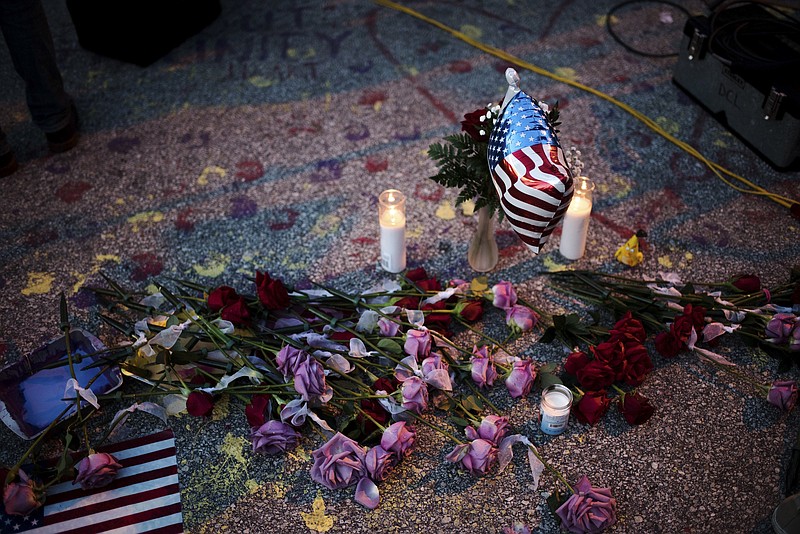You can't say you are against terrorism and not say you are for more commonsense gun laws.
How many more mass shootings - whether they are perpetrated by foreign "terrorists," "homegrown extremists" or simply a mentally ill "madman" - must we cry over before we connect the dots?
This time the massacre was in Orlando, Fla., in a devastating Saturday night attack at a gay nightclub. Fifty are dead, including the shooter, and 53 are injured.
The Orlando shooter actually may fit all three of the descriptions above, not unlike the killer who brought terror to Chattanooga last year.
"It appears that the shooter was inspired by various extremist information that was disseminated over the internet," President Barack Obama said Monday morning, "At this stage, we see no clear evidence that he was directed externally. It does appear that at the last minute, he announced allegiance to ISIL, but there's no evidence so far that he was, in fact, directed by ISIL. Also, at this stage, there's no direct evidence that he was part of a larger plot. In that sense, it is - it appears to be similar to what we saw in San Bernardino."
And Chattanooga.
Three Muslim men born in America, exploring hate online, legally arming themselves not just with guns but with guns of war, then making assaults on gays, co-workers, U.S. servicemen. And they all made these assaults expecting - even designing - to die themselves.
Unfortunately the pattern - both of these and other shootings and of the attacks' aftermath - is now so common and mundane to us that we know the threads of debate that will follow. So on Monday, without waiting for the usual week to elapse before talk turns to guns, Obama waded straight into the discussion. He said countering the extremist ideology of ISIS is as important as ever, but so is discussion of the risks we take with lax laws that make powerful firearms all too easily available.
"My concern is that we start getting into a debate, as has happened in the past, which is an either/or debate. The suggestion is either we think about something as terrorism and we ignore the problems with easy access to firearms or it's all about firearms and we ignore the role, the very real role, that organizations like ISIL have in generating extremist views inside this country," Obama said in an address to the nation.
"It's not an either/or. It's a both/and. We have to go after these terrorist organizations and hit them hard. We have to counter extremism, but we also have to make sure that it's not easy for somebody who decides they want to harm people in this country to be able to obtain weapons to get at them," he said.
One of the primary headlines of the Orlando story is that the killer was known to the FBI. In fact, the FBI had twice investigated him - once when co-workers reported alleged claims of terrorist links. Later the FBI looked at him again when his name surfaced as someone who attended the same mosque as a suicide bomber, and mosque-goers thought he, too, might have been self-radicalizing. Each time, the FBI came away with no conclusive finding, according to FBI Director James Comey.
But what if agents had found something? What if they had formally put this killer on a terrorist watchlist? It would have made no difference in whether he could buy guns - even that assault rifle. So despite FBI concerns, the Orlando killer bought his guns legally in the week before the shootings.
People on the U.S. government's terrorist watchlist are deemed too dangerous to board commercial airliners, but they can walk into a gun store and legally buy pistols and powerful, military-style assault rifles because our Congress couldn't muster the backbone last year to go up against the mighty National Rifle Association.
As if we didn't need any further example that terrorists can buy guns too easily in America, a March 2015 analysis by the Government Accountability Office found that people on the FBI's consolidated Terrorist Watchlist successfully passed the background checks required to purchase firearms more than 90 percent of the time, with more than 2,043 approvals between 2004 and 2014.
That means more than 2,000 suspects on the FBI's watchlist bought weapons in the U.S. over the 11 years before March 2015, openly and legally, because Congress and state lawmakers - not the president - helped them to do it.
A more recent New York Times analysis of where Americans can buy guns found that for every Starbucks in the U.S., there are six licensed gun dealers.
Clearly, it's quite fair to say it isn't much harder to buy a gun - even an assault rifle that fires 45 rounds a minute - than to buy a cafe mocha, even if you're a terrorist, a homegrown extremist or an everyday madman.
This just doesn't make good sense.
